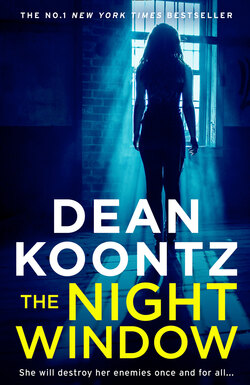Читать книгу The Night Window - Dean Koontz - Страница 16
9
ОглавлениеThe sky unseen behind the raveling white skeins with which it cocooned the world, and on the terrace Mai-Mai’s once lovely form stiffening under a crystalline lacework …
This side of the windows, Tom Buckle repeats, “Performance art,” though the artist is not going to stand up, bloodied and brainless, to take a bow.
Adam, Brad, and Carl, the three most senior members of the ranch’s eighteen-man security force, who once had other names and personalities and real lives, enter the breakfast room. They are dressed in black, with the Crystal Creek Ranch logo in white stitching on the breast pockets of their shirts.
Although Tom Buckle still regards the suicide of Mai-Mai with stunned disbelief, he at once responds to these three men with fear and alarm, as well he should. They have the intensity of wolves on the hunt, and though their stares are as sharp as filleting knives, there is a deadness in their eyes that implies, quite accurately, that they are as coldhearted as machines.
“Tom,” Hollister says in a tone of voice that suggests nothing out of the ordinary has occurred, “do you remember the name of the brainwashed assassin in The Manchurian Candidate?”
Tom eases away from the newcomers. “What is this? What the hell is happening here?”
In answer to his own question, Hollister says, “His name was Raymond Shaw. Specimens like these three”—he gestures toward the security agents—“we call rayshaws. One word. Lowercase r. They’re adjusted people, injected with a control mechanism. But this nanoweb is different from those administered to Mai-Mai and Nick Hawk and others on the Hamlet list. This version scrubs away their memories, every last one, deconstructs their personalities, and programs them to be bodyguards who, without hesitation, will give their lives for their master. I am their master, Tom, and if I tell them to kill you, they will do so with extreme prejudice.”
The film director eases away from the rayshaws until he backs into a sideboard. He is physically rigid, but there is no doubt he’s reeling mentally and emotionally.
“Your work has earned you a place on the Hamlet list, Tom, and therefore a death sentence.”
The filmmaker dares to look away from the rayshaws and meet his host’s eyes. Although he is a screenwriter as well as a director, he is at a loss for words, perhaps struggling to make sense of this bizarre turn of events and plug it into a dramatic structure that promises him a triumphant resolution.
“I could order these men to subdue you and inject you and send you back to California with no knowledge of anything that has occurred here.”
Wainwright Hollister rounds the end of the table, approaching Tom Buckle.
“Do you know Roger and Jennifer Boseman?”
As if shell-shocked, Tom says, “What?”
“Roger and Jennifer Boseman?”
“They live next to me, neighbors, next door.”
“Their daughter Kaylee, ten years old. She’s quite a beautiful child. After you’re injected, adjusted, and sent home, if I call you in a few weeks and instruct you to kidnap Kaylee, rape her, torture her, kill her, and then kill yourself … you will obey.”
He comes face-to-face with his guest.
“After that outrage, the two acclaimed films you’ve made will be judged the work of a monster, withdrawn from distribution in all formats, never to be seen again. Whatever small effect you’ve thus far had on the culture will be erased.”
The director finally accepts what he desperately doesn’t want to believe. “Dear God, it’s real. The nanoweb, the injections, the enslavement.”
“Yes. But ‘enslavement’ is the wrong word, Tom. Most human beings are impetuous, imprudent, ignorant, given to superstition and other irrational behavior. They’re maladjusted. For their own sake and to preserve this fragile planet, we merely intend to adjust them.”
“You’re insane.”
“No, Tom. I’m the clearest-thinking person you’ll ever meet. I have no illusions about the meaning of life.”
Hollister favors the younger man with a kindly smile worthy of a country doctor in a painting by Norman Rockwell.
“I’m also a man of profound convictions. I don’t always leave the dirty work to others. Sometimes I do the adjusting myself. The adjusting or, as in your case, the extermination. But I am also a fair man, Tom. In the contest to come, you will have a chance to survive.”
As though inspired by countless moments of movie heroics, Tom Buckle throws a punch, but as ineptly as a supporting character who is playing a fool. Hollister blocks the blow with a forearm, seizes Buckle’s wrist, twists that arm up behind the man’s back, and shoves him hard. The director staggers into the window wall and slaps both palms against the glass to stop himself from crashing through.
To the rayshaws, Hollister says, “Mr. Buckle needs to be suited up and instructed as to the rules of the hunt.”
Just then the first wind of the storm invades the terrace, and the scarlet silk scarf, which once covered Mai-Mai’s pistol, billows off the snow-skinned flagstones and undulates six or seven feet above her corpse, as though it is her very spirit, risen from her hushed and cooling heart.
